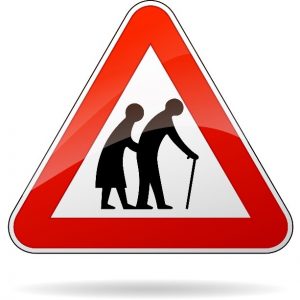The Impact Of Inadequate Protein Intake On Healthy Aging
Author: Dr. Stephen Chaney
Do older adults eat enough protein?
 Most Americans lose lean muscle mass as they age, a physiological process called sarcopenia. There are three factors that influence the rate at which we lose muscle mass as we age:
Most Americans lose lean muscle mass as they age, a physiological process called sarcopenia. There are three factors that influence the rate at which we lose muscle mass as we age:
- Our physiology changes. Our bodies break down our protein stores more rapidly and we have a harder time utilizing the protein in our diet to replenish those protein stores.
- We become less active. In some cases this reflects physical disabilities, but all too often it is because we are not giving weight-bearing exercises the proper priority in our busy lives.
- Our diets become inadequate. The major driver of this phenomenon is loss of appetite which results in decreased caloric intake. However, physical disability, isolation, and insufficient income also contribute.
Sarcopenia in turn results in:
- Loss of muscle strength. Even the simple act of picking up a grandchild or a bag of groceries can become problematic.
- Increased risk of falls and fractures.
- Lower quality of life.
Obviously, sarcopenia is a major health issue for those of us in our golden years. If you are younger, it is a concern for your parents or grandparents. Sarcopenia is a health issue that affects everyone.
But what can be done to prevent sarcopenia? We can’t change our physiology, but we can change our activity level and our diet. Weight-bearing exercise tugs on our muscle fibers. That stimulates those fibers to incorporate protein into new muscle cells. It is no wonder that weight-bearing exercise is recommended for preventing sarcopenia.
What about diet? Are older adults getting enough protein in their diet? The conventional wisdom is that protein intake is not a problem. We’ve been told that Americans get enough protein in our diet. In fact, we’ve been told that most of us get more protein than we need.
Is that true for older Americans? In fact, very few studies have specifically looked at protein intake in older Americans. This study (JL Krok-Schoen et al, The Journal of Nutrition, Health & Aging, 23: 338-347, 2019 ) was designed to fill that void.
How Was The Study Done?
 This study used data on 11,680 Americans who participated in NHANES surveys between 2005 and 2014. (NHANES or National Health and Nutrition Examination Surveys is a program run by the CDC that is designed to assess the health and nutritional status of adults and children living in the United States).
This study used data on 11,680 Americans who participated in NHANES surveys between 2005 and 2014. (NHANES or National Health and Nutrition Examination Surveys is a program run by the CDC that is designed to assess the health and nutritional status of adults and children living in the United States).
Participants in the study were grouped into three groups: 51-60 years (4,016 participants), 61-70 years (3,854 participants), and 71 years and older (3,810 participants).
Protein intake and diet quality were based on the average of two 24-hour dietary recall interviews. Trained dietary interviewers collected detailed information on all foods and beverages consumed during the past 24 hours.
Participants also filled out a questionnaire designed to assess health outcomes that might be affected by loss of muscle mass.
Note: The NHANES database is used for many studies on the association between diet and health outcomes. However, it is important to remember that a 24-hour diet recall is a single snapshot in time. This is a weakness of this and all similar studies. For example, in this study a participant’s average protein intake may be more or may be less than the amount reflected in the 24-hour diet recall.
Are Older Adults Eat Enough Protein?
 To determine whether American older adults eat enough protein in their diet, the investigators compared protein intake in each age group with the DRI (Dietary Reference Intake) for protein of 0.8 grams of protein per kilogram of body weight (0.36 grams per pound). This is the standard set by the Food & Nutrition Board of the National Academy of Sciences for all adults over the age of 19.
To determine whether American older adults eat enough protein in their diet, the investigators compared protein intake in each age group with the DRI (Dietary Reference Intake) for protein of 0.8 grams of protein per kilogram of body weight (0.36 grams per pound). This is the standard set by the Food & Nutrition Board of the National Academy of Sciences for all adults over the age of 19.
The results were:
- Up to 46% of older adults were not getting the recommended 0.8 g/kg/day of protein. When broken down by age groups, the percentages were:
-
- 38% of the 51-60 age group.
- 42% of the 61-70 age group.
- 46% of those over 70.
- Women were more likely to be consuming inadequate protein than men.
- Blacks were more likely to be consuming inadequate protein than other demographic groups.
When the investigators looked at the correlation between diet quality and protein intake, those consuming inadequate protein:
- Had significantly lower calorie intake.
- Skipped meals more frequently.
- Had lower HEI (Healthy Eating Index) scores. Specifically:
- They scored low on intake of greens, beans, dairy, total protein foods, seafood protein foods, and plant protein foods.
- They scored high on intake of refined grains and added sugars.
- Had inadequate intakes of fiber, zinc, selenium, vitamin C, vitamin E, and vitamin D.
The Impact Of Inadequate Protein Intake On Healthy Aging
![]() When the investigators compared older adults with inadequate protein intake to adults in the same age groups with adequate protein intake, those with inadequate protein intake:
When the investigators compared older adults with inadequate protein intake to adults in the same age groups with adequate protein intake, those with inadequate protein intake:
- Had a higher prevalence of physical, mental, and social limitations.
- Were more likely to be limited when stooping, crouching, or kneeling, standing or sitting for long periods, walking up 10 steps, preparing meals, and walking for a quarter mile.
- They had trouble lifting more than 10 or 15 pounds.
Limitations on everyday activities like these have a significant impact on the quality of life experienced by these individuals.
What Does This Study Mean For You?
 If you are over 50 or have a family member over 50, this study should serve as a wake-up call. You or your loved ones may not be getting enough protein.
If you are over 50 or have a family member over 50, this study should serve as a wake-up call. You or your loved ones may not be getting enough protein.
In the words of the authors: “A considerable portion of older adults (31%-50%) did not meet their protein recommendation (0.8 g/kg/d)…This contradicts the common perception that Americans are usually meeting or exceeding the 0.8 g/kg/d protein recommendation.”
- The situation may be even worse than this study indicates. This study used the DRI standard for adequate protein intake of 0.8 g/kg/d. Many recent studies suggest that significantly higher protein intakes (1-1.2 g/kg/d) are needed for older adults to prevent loss of muscle mass (sarcopenia). If so, the likelihood that you or your loved ones are not getting enough protein is even higher.
In the words of the authors: “There is a general consensus recommending dietary protein intakes of 1-1.2 g/kg/d…for older adults…If over one third of older adults are not meeting the recommendation of 0.8 g/kg/d, these data suggest that far fewer older adults would be meeting the proposed higher levels (1-1.2 g/kg/d) needed to meet the demands to promote healthy aging.”
 The consequences of inadequate protein intake in the older adults may have a significant effect on their quality of life.
The consequences of inadequate protein intake in the older adults may have a significant effect on their quality of life.
In the words of the authors: “This analysis found a positive association between achieving the recommended protein intake and self-reported physical functioning. The functional limitations associated with not meeting the protein requirement were all related to activities of daily living…”
- Because of decreased appetite in many older adults, it is difficult to meet protein intakes of 1-1.2 g/kg/d with food alone. Protein supplementation can play a valuable role.
In the words of the authors: “When food alone is insufficient to meet a patient’s needs, oral nutritional supplementation may provide a means to meet protein intake recommendations.
“To some extent, sarcopenia can be managed with protein supplementation, considering all the factors that are working to reduce food intake in aging.” [The authors used the phrase “To some extent” because weight-bearing exercise is also required to manage sarcopenia].
- While this study focused on protein intake, weight-bearing exercise is also essential to prevent sarcopenia. Exercise and adequate protein intake work together to build and maintain lean muscle mass.
- Finally, we should not ignore the fact that those adults who were not getting enough protein were also getting insufficient levels of many micronutrients that affect the aging process. A good diet and supplementation are also important for healthy aging.
Specifically, the authors noted:
- “Dietary fiber is associated with many benefits, especially in reducing the risk of heart disease.”
- “Vitamin D inadequacy is associated with reduced mobility and an increase in risk for falls and fracture.”
- “Zinc deficiencies…may cause dysfunctions in immunity and reduced healing time.”
The Bottom Line
A recent study analyzed protein intake in older American adults. The conclusions of the study were:
- If you are over 50 or have a family member over 50, this study should serve as a wake-up call. You or your loved ones may not be getting enough protein.
- The situation may be even worse than this study indicates. This study used the DRI standard for adequate protein intake of 0.8 g/kg/d. Many recent studies suggest that significantly higher protein intakes are needed for older adults to prevent loss of muscle mass (sarcopenia). If so, the likelihood that you or your loved ones are not getting enough protein is even higher.
- The consequences of inadequate protein intake in the older adults may have a significant effect on their quality of life.
- Because of decreased appetite in many older adults, it is difficult to meet protein intakes of 1-1.2 g/kg/d with food alone. Protein supplementation can play a valuable role.
- While this study focused on protein intake, weight-bearing exercise is also essential to prevent sarcopenia. Exercise and adequate protein intake work together to build and maintain lean muscle mass.
- Finally, we should not ignore the fact that those adults who were not getting enough protein were also getting insufficient levels of many micronutrients that affect the aging process. A good diet and supplementation are also important for healthy aging.
For more details on the study, read the article above.
These statements have not been evaluated by the Food and Drug Administration. This information is not intended to diagnose, treat, cure or prevent any disease.
